If there is one thing true about 2012 up to this point, it’s that this is the year that the debate between shooting a film on, well, film, or shooting one digitally, has hit a peak. Be it Paul Thomas Anderson’s latest film finding a groundswell of support for seeing it in, admittedly its best format, 70mm, or a recent canceling of director Brian De Palma’s Passion due to an issue with a digital file, the debate has raged this calendar year at a level not seen until today.
Well, chalk up yet another masterful example for why, while digital may be making itself popular year after year, true film is far from dead.
From director Miguel Gomes comes a breathtaking film entitled Tabu, that, shot on both 35mm and vibrant 16mm, is not only an ode to film as a palpable entity, but cinema as a concept, as well as being a touching meditation on love, loss, and longing.
Tabu is a film broken into two parts. Following a beautifully meditative prologue, the film introduces its viewer to Aurora, a recently hospitalized elderly woman. Asking her neighbor, Pilar, to visit a past love named Gian Luca, the second half of the film gives us the back story to their relationship, finding the pair falling madly in love with one another during the early days of the Portuguese Colonial War. Flipping from a wordy, almost densely obtuse dialogue piece into what is best described as a piece of silent film-inspired performance art, Tabu is an often times a thick tone poem of a film that is both breathtakingly expressive while also being nearly impenetrable.
Gomes, much like many of his auteur contemporaries, is this film’s main author. Using awe-inspiring 35mm and 16mm black and white photography, the film blends static dialogue sequences during the early moments of the film, with what is best described as a proto-Malickian sense of mood and atmosphere in the back end. Very much inspired by the Badlands director’s debut feature (only aesthetically), the film features both static takes and also sweeping tracking shots, both of which look thrilling in all of its cinema-loving glory. Far more of an ode to silent cinema than the art exercise that is the insufferable Oscar winner, The Artist, Tabu is as gorgeous a film as we’ve seen all year.
Ostensibly a film, tonally and aesthetically, like Apichatpong Weerasethakul’s masterful Uncle Boonmee (just sans the Wookie), Gomes also gives Tabu an assured sense of its themes. Inherently a film about love and unrequited love, the film is as warm and inviting as a black and white feature could ever imagine to be, and features such frank romance and eroticism that it’s rapturous. A tad overlong, and almost too dense for its own good, Tabu is a film that may not be for everyone stylistically or intellectually, but if the film’s style leaves you cold, then hopefully the great performances will change that.
Starring Teresa Madruga, the first portion of Tabu is driven by the verbal acuity of its stars. The performances, or at least a majority of them, are rather emotionally empty, simply relying on the ability for the performers to carry long bits of dialogue skillfully. This portion of the film is admittedly icy and leaves the viewer feeling distant, but not for a lack of reward. The ideas the film conveys here, particularly in a handful of the more romantic interchanges, is really quite wonderful, and adds a lot of depth to the film. However, it comes alive in the latter half of the film, with its two stars, Ana Moreira and Carloto Cotta carrying some of the best performances of 2012. They are very much ‘silent film performances’ in that everything is done with their physicality, but they seem thrillingly modern in how muted they are, not relying on cartoonish Artist-esque theatrics but instead the film is almost Haneke-esque in how distilled and frigid it is performance-wise.
Overall, with some of the best non-Paul Thomas Anderson directed film footage that 2012 has to offer, along with a fantastic soundtrack, score and performances, Tabu is truly unlike anything you’ve seen all year. Currently running at NYFF, the film will debut theatrical this December. Run, don’t walk, when it arrives in your town.






![Bergman Island (The Criterion Collection) [Blu-ray]](https://criterioncast.com/wp-content/uploads/2022/11/bergman-island-the-criterion-collection-blu-ray-400x496.jpg)
![This Is Not a Burial, It’s a Resurrection (The Criterion Collection) [Blu-ray]](https://criterioncast.com/wp-content/uploads/2022/11/this-is-not-a-burial-its-a-resurrection-the-criterion-collection-blu-ray-400x496.jpg)
![Lars von Trier's Europe Trilogy (The Criterion Collection) [The Element of Crime/Epidemic/Europa] [Blu-ray]](https://criterioncast.com/wp-content/uploads/2022/11/lars-von-triers-europe-trilogy-the-criterion-collection-the-element-of-400x496.jpg)
![Imitation of Life (The Criterion Collection) [Blu-ray]](https://criterioncast.com/wp-content/uploads/2022/11/imitation-of-life-the-criterion-collection-blu-ray-400x496.jpg)
![The Adventures of Baron Munchausen (The Criterion Collection) [4K UHD]](https://criterioncast.com/wp-content/uploads/2022/11/the-adventures-of-baron-munchausen-the-criterion-collection-4k-uhd-400x496.jpg)
![Cooley High [Criterion Collection] [Blu-ray] [1975]](https://criterioncast.com/wp-content/uploads/2022/11/cooley-high-criterion-collection-blu-ray-1975-400x496.jpg)